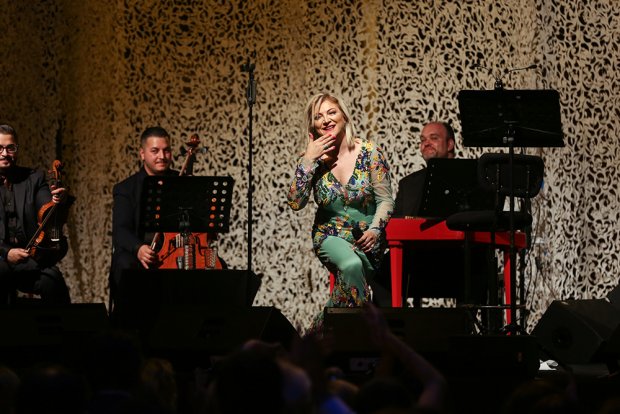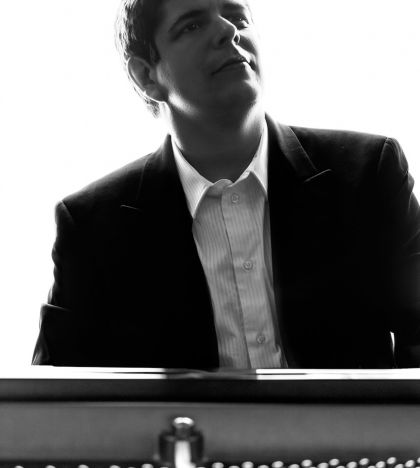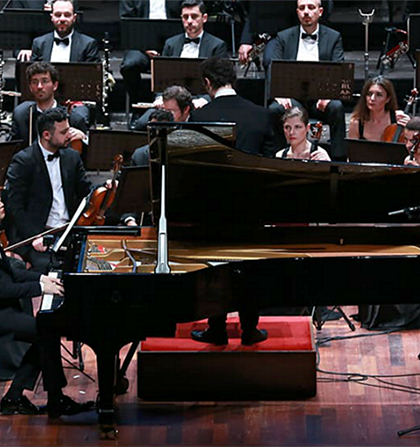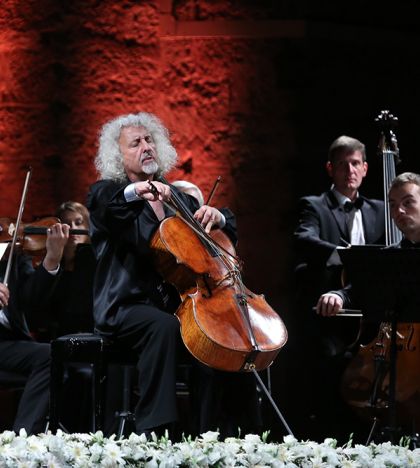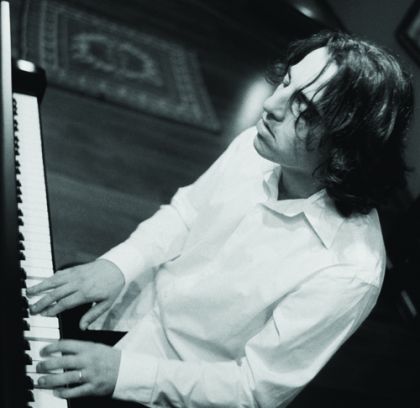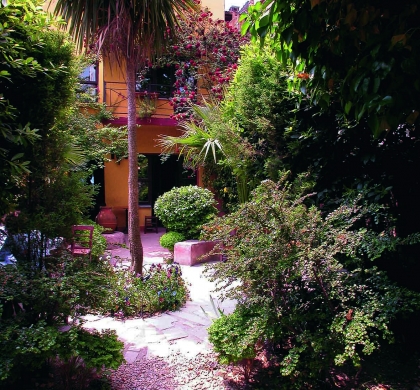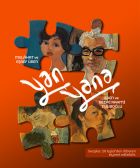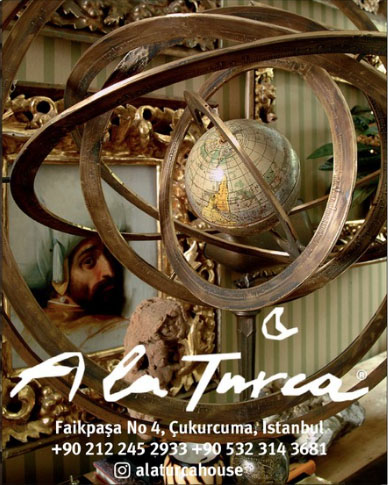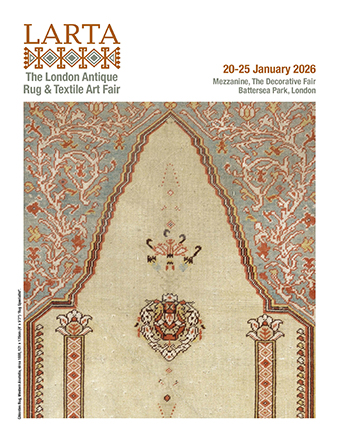Your reviewer’s final foray into the 46th İKSV İstanbul Music Festival was a concert on the platform of Sirkeci Railway Station on Wednesday, June 6. Featuring the Turkish singer Meral Azizoğlu and the Hungarian ‘Gypsy Fire’ ensemble, the music was preceded by a talk given by the novelist and short story writer Mario Levi.
Mario Levi’s theme was İstanbul, which was no surprise – he is, after all, the author of İstanbul Bir Masaldı (İstanbul Was a Fairytale, 1999) and of İçimdeki İstanbul Fotoğrafları (The Photographs of Istanbul I Have Inside Me, 2010). His main thesis was that the dominant emotion inspired by the city is hüzün – a word he said was untranslatable, but nevertheless I will have a go. How about ‘a kind of sadness that is rather self-indulgent, and therefore not altogether unpleasant’, or perhaps ‘recreational melancholy’? I would be interested to hear any other suggestions as to how best to translate this word.
He made the altogether valid point that for many, ever since the Balkan Wars of 1911–12, Istanbul has been a place of exile. All İstanbullu who have been living in the city for three generations or more have a memory, somewhere in their family’s past, of at least one enforced migration. 'The cruellest thing that can be done to anyone,' Mr Levi said, 'is to uproot them from their native land.' He referenced the departure of non-Muslims from İstanbul between the 1940s and the 1960s in response to government-inspired persecution, and the more recent arrival of migrant Turks from Anatolia. (It is true that these people’s relocation, being voluntary in nature, is a slightly different matter, but they are, after all, just as subject to hüzün as the next person.) It occurred to me that the choice of Sirkeci Station as the location for a talk on this theme was entirely appropriate: how many İstanbullu, I wonder, have left the land of their birth on the Orient Express, never to return?
It was from Sirkeci that a large number of the members of the Ottoman Imperial Dynasty took the train into exile on March 6, 1924, following the passing, three days previously, of Law No. 431 – under the terms of which the Turkish citizenship of all members of the Imperial family was annulled and they were compelled to leave the country. Rumour has it that Atatürk himself would not have gone so far as to banish the entire family (in total, 156 persons were affected by this law), but only the Imperial Princes. However, İsmet İnönü, Prime Minister at the time, was adamant. Abdülmecid Efendi, the Caliph, had already been packed off. He and members of his immediate family had been taken by car to Çatalca, fifty kilometres further along the railway line in the direction of the Bulgarian border, and put on board the Orient Express there: the government thought it wise not to provoke a public reaction by putting the Caliph on the train at Sirkeci.
I will let HIH Prince Ali Vâsıb, a great-grandson of Sultan Murad V, take up the story (which is told in full in his autobiography Memoirs of an Ottoman Prince, the English version of which was published by Timaş Publishing in 2017):
So we were to leave our beloved homeland on the Orient Express at 9:30 on the evening of 6th March 1924. At around eight that evening, we… bade our final farewells to our senior and junior maids and the rest of our staff; then we left our house on Serencebey Rise. The cases and trunks that were to travel with us were carried down to the coast, where they were loaded into two large boats and taken to the quay alongside Sirkeci station… When we arrived at the station, we sat in the buffet while Aziz Bey registered our luggage. The whole place was full of our male and female relatives. Members of our family had reserved almost all the available places on the train, so there was virtually no one on it except for us.
There were quite a lot of police on the station, and after our passports had been examined the Police Chief gave them back to each of us himself… A crowd of people had gathered outside the building; they stood around looking downcast and subdued. Out of all my personal friends, the only people I saw on the station were Captain Wheeler (the aide-de-camp of my American friend Admiral Bristol), Zaimzade Abdülmennan Bey (my schoolmate from Galatasaray High School), and his elder brother Rıdvan Bey. No one else had come to say farewell to me. I was grateful to these people for the kindness and consideration they had shown in coming to be by my side in my darkest hour, and I thanked them for this demonstration of their friendship. Anyway, eventually we got on the train and it set off.
There were policemen in the corridors, and they stayed on the train until we reached the Bulgarian border. Many of them had tears in their eyes and were obviously upset…
The reason why so few of Prince Ali Vâsıb’s friends and acquaintances had come to see him off was fear of official disapproval: a smear campaign had been mounted in the press to denigrate the Imperial family as a preparation for their expulsion. In fact, the Imperial Princesses were allowed back to Turkey only in 1952; the Imperial Princes, however, were not permitted to return until 1974 – after fifty years in exile.
So I would entirely agree with Mario Levi that İstanbul is a city of exile – both for those coming to it after being uprooted from elsewhere, and for those forced to leave it after being disabused of the assumption that they had the right to regard it as their permanent home.
The location for the concert that followed the talk was the platform on the station that is nearest the sea, with a train parked on the landward side of the audience to shield it from the gaze of passengers going in and out of the entrance to the Marmaray Line. I had been expecting the music to be Türk Klâsik Müziği of a rather more serious nature, having been (in February) to see Ms Şevval Sam perform in the musical Müzeyyen, a celebration of the life of the singer Müzeyyen Senar (1918-2015). Here is a link to a ‘best of’ collection of songs performed by the late Ms Senar. Consumption of rakı and a solid hunk of hüzün with your white cheese is de rigueur while listening to this:
The Turkish music on offer at Sirkeci was, however, of a more light-hearted nature, mostly originating from the first half of the 20th century. Ms Azizoğlu, an obviously experienced performer in her genre, was wearing a most fetching blue costume – which must have been an unwelcome restriction to her movements in the oppressive heat. Although the concert began at 9 in the evening, the temperature seemed to go up rather than down as time went on, and it was only towards the end of the programme that a breath of wind was felt as bolts of lightning seared the distant sky.
The Hungarian ‘Gypsy Fire’ ensemble that accompanied her consisted of a violin, a viola, a cello, a double bass and a ‘cimbalom’ – a type of dulcimer with metal strings favoured by the central European Roma. I first came across this instrument while performing (the French horn) in Zoltán Kodály’s Háry János Suite, where it supplies a pleasant background tinkling (except in the ‘Intermezzo’ movement, where it comes to the fore). Here is a link to a performance of the aforesaid ‘Intermezzo’ played by a Japanese lady, Junko Sakimura:
The register of the cimbalom used at the concert in Sirkeci seemed, however, to be lower than I had expected given a nodding acquaintance with the instrument. In fact, the cimbalom, the cello and the (highly amplified) double bass combined to produce a rather harsh sound, especially in the nether regions; in fact, it sometimes swamped the singer. If I had had my way, I would have replaced the cello with a clarinet as the bass line was already strong enough, and perhaps encouraged the cimbalom-player to concentrate on the upper register.
There were some impressive solos from the violin, however, and the singer gave a nice ‘bad girl’ performance in Ahmet Şefik Gürmeriç’s song ‘Gönlüm Sensiz Olmaz’. Is it ungenerous of me to observe that I would have preferred a traditional Turkish kanun to the cimbalom? I have to admit, however, that this latter instrument gave us a magnificent solo at the beginning of Kaptanzade Ali Rıza Bey’s ‘Yıldızların Altında’, using European scales rather than Turkish makam.

I chose to attend this particular concert in order to redress two important balances. Firstly, I had not previously attended any of the concerts of Turkish music. Secondly, although I had been twice each to the Lütfi Kırdar Concert Hall and the Aya İrini, I had not sampled any of the other locations. In fact, the festival offered a variety of interesting alternative venues (apart from Sirkeci Station): the Ashkenaz Synagogue in Karaköy, the Austrian Culture Forum in Yeniköy, the Albert Long Hall at Boğaziçi University in Bebek, Bomonti Ada in Şişli, the İş Sanat Concert Hall in Levent, the Italian and Neve Shalom Synagogues in Galata, Kalpakçılar Caddesi in the Grand Bazaar, the Rahmi M Koç Museum in Hasköy, two churches in Beyoğlu (St Peter and Paul and the St Anthony Lower Church), the Süreyya Opera House in Kadıköy, and the Sankt Georg Church in Karaköy.
And so to next year’s festival, when your reviewer hopes to have the opportunity (unless previously cast into the outer darkness as an incompetent charlatan of base and uninformed opinions) to listen to some concerts at one or more of the above places as well as the more traditional concert halls. What I would really like, however, is to be entertained by a group of madrigal singers giving a performance of Orlando Gibbons’s ‘The Silver Swan’ from a caïque on the Golden Horn. Or even to be rowed around in a boat in the Basilica Cistern in Sultan Ahmet as a fanfare of trumpets is sounded and multicoloured lights play upon the water as the echoes multiply themselves to infinity. Slightly unrealistic requests, I know, but pleasing fantasies nonetheless.
My thanks go out to all those who played a part – of any kind – in the organisation of the İKSV İstanbul Music Festival. A fine thing, and long may it continue.
Photographs by Ali Güler.
John Shakespeare Dyson joined the Cornucopia Arts Diary as classical music reviewer in 2018. He took part-time lessons in piano and composition at the Royal Manchester College of Music, and later at the Guildhall School of Music. In between the two, he studied music at Emmanuel College, Cambridge. He is now a freelance translator, author and editor living in Istanbul.

